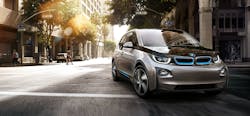BMW Steps Up E-Car Target to 700,000 by 2025 as Fines Loom
BMW AG plans to increase sales of electric and plug-in hybrids by 30% every year until 2025 to help meet incoming stringent emission regulation in the European Union, prompting the carmaker to accelerate the rollout of battery models.
The German manufacturer moved up a goal for a lineup of 25 electric and plug-in hybrid models by two years to 2023, it said Tuesday, following plans by other carmakers like Volkswagen AG to keep up with tightening regulation. This puts BMW on a trajectory to sell roughly 700,000 electrified vehicles by 2025.
The quicker ramp up on electric cars will put the world’s second-biggest luxury carmaker on a trajectory to meet EU regulation by 2021 on CO2 and avoid fines, Chief Financial Officer Nicolas Peter told reporters in Munich.
“We will achieve them from my perspective, no doubt,’’ Peter said.
Carmakers in Europe are exposed to potentially billions in fines on tough regulations for carbon dioxide fleet emissions that’ll be phased from next year. Rather than falling, automakers’ CO2 emissions have been going up for the past two years due to demand for larger sport utility vehicles and consumers buying fewer diesel cars. Diesels emit about a fifth less CO2 than equivalent gasoline vehicles.
From 2020, much of the EU car fleet will be capped at 95 grams of CO2 per vehicle per kilometer driven. Currently, BMW sits at 128 grams, Chief Executive Officer Harald Krueger said.
The regulation is adding to a bevy of headwinds for the industry as it transitions into electric cars, while also battling trade tensions and a slowing global economy. To tackle the challenges, BMW has put in place a 12 billion euro ($14 billion) cost-cutting program.
BMW currently offers one battery-powered vehicle, the i3 city car, which it started selling in 2013. It’s adding an electric Mini later this year. The company sold 142,000 electric and plug-in vehicles last year, a rise of 38% to make up about 6% of total deliveries. Demand this year has slowed, rising about 2% through May.
Other carmakers have also increased targets for electric vehicles in recent months. Daimler AG in May said that more than half of its Mercedes-Benz brand cars would be plug-in hybrid or electric variants by 2030, while Volkswagen plans to sell more than 1 million purely electric cars by 2025.
BMW on Tuesday also announced it would only buy electricity from renewable energy sources from 2020 onward for all its locations. Separately, the carmaker said it has set aside between 100 million euros and 500 million euros in order to deal with Brexit.
About the Author
Bloomberg
Licensed content from Bloomberg, copyright 2016.
